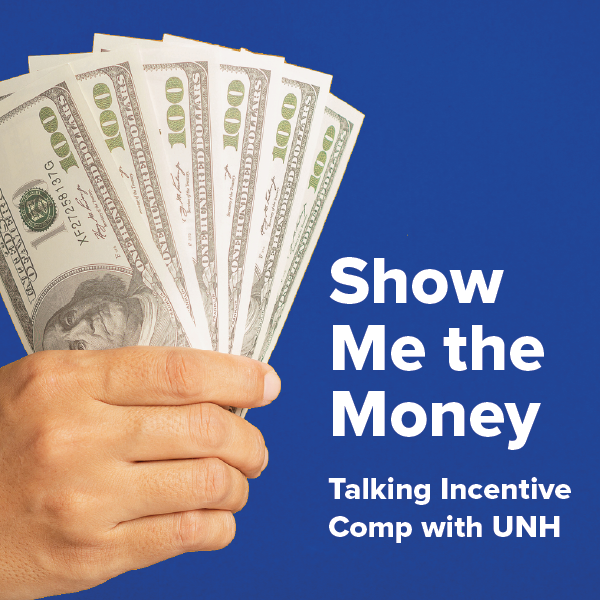“Incentive compensation doesn’t belong in higher ed”
…or does it?
The typical gift officer stays with an organization for 18 months before moving to another role. The average time it takes to close a gift is twice that. On top of that, 3 out of 10 fundraisers are ready to leave the industry altogether.
Amidst the “great advancement resignation”, a focus on gift officer retention is critical. Incentive compensation has long been a taboo subject in higher ed – but it really shouldn’t be. Incentive comp can be an integral piece in retaining top talent, keeping them at your institution longer, and helping donor relationships continue to grow.
Four years ago, the University of New Hampshire launched the quiet phase of its current campaign and also rolled out a new initiative to pay performance-based incentive compensation to its gift officers. And, get this: for the past three consecutive years, every eligible gift officer has hit their metrics, despite increased goals across the board. The University also just finished its top fundraising year of all time.
Incentive comp works. After sharing some of these game-changing insights with Brent Grinna on the RAISE Podcast, Troy Finn, AVP of Development at the University of New Hampshire, joined us on a webinar to show a behind-the-scenes look at their incentive compensation program and strategies for keeping UNH employees happy and engaged.
Check out the full webinar to hear his thoughts on:
Why incentive comp feels like such a taboo subject in higher ed – and how to change the narrative
We don’t need to be afraid to talk about incentive compensation in advancement! Troy cleared up some common objectives about incentive compensation programs like:
- “It’s too expensive.” Sure, additional budget needs to be allocated, but it might not be as much as you think. UNH doesn’t frame incentive comp as a “bonus”, but rather as an additional part of a gift officer’s overall potential compensation. Payouts don’t need to be huge, they just need to be meaningful.
- “Gift officers shouldn’t get a cut of the gift.” Exactly -They shouldn’t. The money gift officers raise should directly benefit the cause they’re making the ask for. And that is how it works…these payouts are not a portion of any philanthropic gift. gift. The budget for incentive comp is entirely separate from any philanthropic efforts.
- “It deters gift officers from being team players.” UNH’s program structure takes on a team mentality – the entire team needs to reach their overall goals before any individuals are eligible to unlock their incentive comp. This prevents the “lone wolf” mentality, and helps gift officers feel like they are really all in it together.
Troy Finn on why incentive comp feels like a taboo subject in higher ed
Incentive comp as just one piece of the puzzle
While Incentive compensation is a forward-thinking tactic, it’s not the end-all solution to staff retention, success, and happiness. Troy recognizes the importance of building a good culture so the team can thrive. UNH offers hybrid and remote work options so gift officers aren’t stuck in an office all day (they should be out on the road on visits, anyways!). They have a robust onboarding and training program with both external coaches and internal guides to show new employees the ropes. And, they equip their gift officers with the best tech stack possible (including EverTrue) to help make their daily work more intentional and efficient.
Why incentive comp is just one piece of the puzzle
How the program at UNH is set up
The UNH team needs to hit all of its goals before any individuals are able to unlock their own incentive compensation. Troy noted that the key to ensuring success with this is to set clear goals and be transparent about them. These goals shouldn’t be totally out of reach – have check-ins throughout the year to ensure the team is moving in the right direction. Regular reviews will allow for support to be provided where it’s needed, and if that support is being provided, no one should struggle to achieve (or exceed!) their numbers.
How the UNH incentive compensation program is structured
Why self care goals should be weighed just as importantly as incentive comp goals
9 out of 10 fundraisers feel extra stress due to the shortage of staff in their institution (Source: The Chronicle of Philanthropy) That is an incredibly high number to ignore – and it’s crucial to acknowledge how stress can impact employee happiness and overall success. Now more than ever it’s important to focus on your team’s health both in and out of the office. By building a culture that acknowledges and emphasizes health and overall happiness, your teams can show up as their whole, healthy selves – increasing performance and retention.
Why self care goals are just as important as incentive comp goals
It seems pretty simple: the more you support, acknowledge, and reward your team for their hard work, the more energized they’ll feel to show up and crush their goals each day. Troy has a great pulse on what the advancement industry should be focusing on in order to accomplish this – and we’re excited to see where he takes things next!
View the entire webinar to hear even more of his insights, and connect with him on LinkedIn to keep the conversation going.
